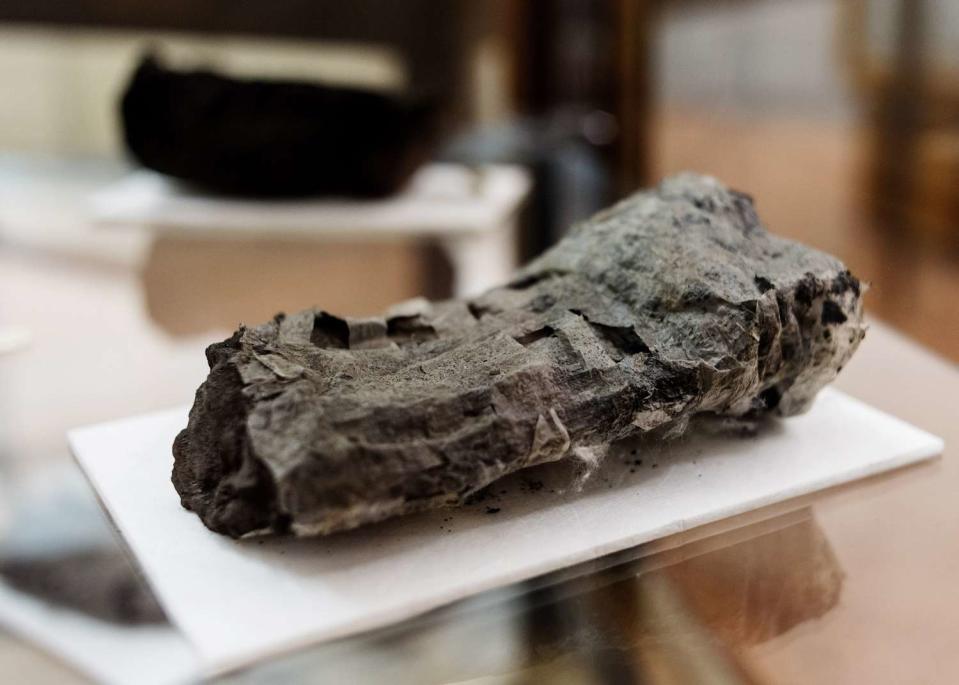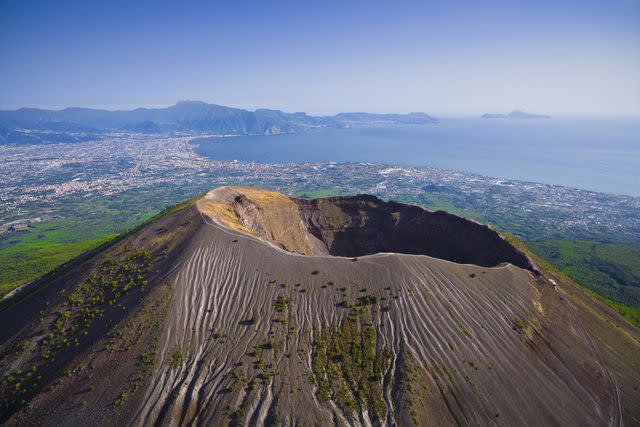Part of an Ancient Herculaneum Scroll Deciphered by AI 2,000 Years After Eruption of Mount Vesuvius
Three researchers won a $700,000 prize for using AI technology to read the scroll

AP Photo/Salvatore Laporta
Ancient Herculaneum scroll.Part of an ancient 2,000-year-old scroll has been deciphered by researchers using Artificial Intelligence (AI).
Three researchers recently won a $700,000 prize for using AI technology to read the paper, which was damaged in the eruption of Mount Vesuvius in 79 A.D., according to a post shared online by the sponsors behind the "Vesuvius Challenge."
The competition, according to those involved, was launched last year to "solve the ancient problem of the Herculaneum Papyri," which were scorched during the natural disaster in Italy so many years ago.
The group that succeeded in the venture included Youssef Nader, a PhD student in Berlin; Luke Farritor, a student and SpaceX intern from Nebraska; and Julian Schilliger, a Swiss robotics student.
Related: Ancient Cemetery in Egypt with 'Book of the Dead' Papyrus and Mummies Has Been Uncovered
Together they used AI to distinguish ink from papyrus and determine what was written on the parchment through pattern recognition.
Never miss a story — sign up for PEOPLE's free daily newsletter to stay up-to-date on the best of what PEOPLE has to offer, from celebrity news to compelling human interest stories.
Ten months ago, we launched the Vesuvius Challenge to solve the ancient problem of the Herculaneum Papyri, a library of scrolls that were flash-fried by the eruption of Mount Vesuvius in 79 AD.
Today we are overjoyed to announce that our crazy project has succeeded. After 2000… pic.twitter.com/fihs9ADb48— Nat Friedman (@natfriedman) February 5, 2024
According to researchers, the ancient scrolls were buried under over 65 feet of volcanic mud and were so fragile that they would be fully destroyed if mishandled.
The author of the Herculaneum Papyri – who researchers believe was Epicurean philosopher Philodemus — wrote about music, food and enjoying life's pleasures, those behind the Vesuvius Challenge said.
Researchers crafted high-resolution CT scans of four scrolls, and the call-to-action required those involved to decipher four passages of at least 140 characters, with at least 85 percent of characters recoverable.
The most recent findings mark about 5% of the first scroll uncovered. "In 2024 our goal is to go from 5% of one scroll, to 90% of all four scrolls we have scanned, and to lay the foundation to read all 800 scrolls," organizers wrote.

Alberto Incrocci / Getty Images
Mt. Vesuvius.The latest findings come about after Farritor decoded the first word from one of the scrolls last year.
The feat earned him a prize of $40,000, after he discovered what turned out to be the Greek word for "purple."
Around the same time, Nader also discovered the word in the same area and was gifted a $10,000 cash prize for his contributions.
Related: 21-Year-Old Wins $40K After Using AI to Read First Word on 2,000-Year-Old Papyrus Scroll
"It's been a great joy to work on this strange and amazing project," Nat Friedman, one of the founders of the Vesuvius Challenge, wrote in a post shared on X, formerly Twitter.
He added, "Thanks to Brent Seales for laying the foundation for this work over so many years, thanks to the friends and Twitter users whose donations powered our effort, and thanks to the many contestants whose contributions have made the Vesuvius Challenge successful!"
For more People news, make sure to sign up for our newsletter!
Read the original article on People.

